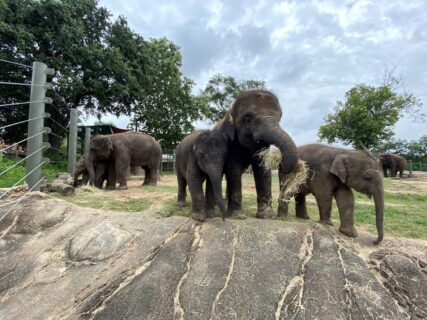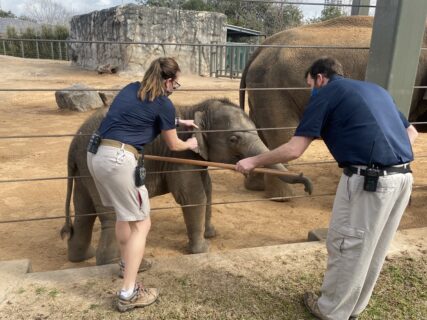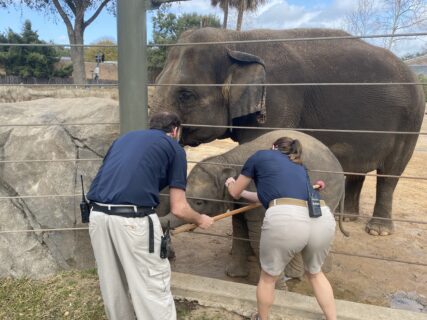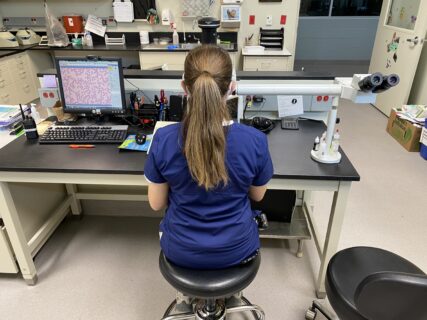A Medical Milestone
 Legacy Community Health has a long history of caring for the greater Houston community, including the youngest members through their pediatric care. Just like the quality healthcare Legacy provides, our animal care teams provide extraordinary care to the animals at the Houston Zoo, including our Asian elephants. Read more about our latest update with Winnie and Teddy below!
Legacy Community Health has a long history of caring for the greater Houston community, including the youngest members through their pediatric care. Just like the quality healthcare Legacy provides, our animal care teams provide extraordinary care to the animals at the Houston Zoo, including our Asian elephants. Read more about our latest update with Winnie and Teddy below!
Winne and Teddy will soon be celebrating their first birthdays on March 20 and May 16, respectively. One important medical milestone goal that our elephant keepers have for this dynamic duo is to be able to collect blood samples from the veins on the back of their ears. This is a trained behavior that our elephant team strives to complete before their first birthday. Since they were about four months old, their keepers have been getting the elephants comfortable with them manipulating their ears, holding off veins to improve blood collection chance, and using faux needles behind their ears to help them get used to this process.
Repetition and relationship building are key to getting Winnie and Teddy comfortable with participating in their own medical care. Multiple times a day, they are trained for blood draw, vaccination, blood pressure, and more.

Elephant Manager Rob Bernardy shares, “We also try to expose them to as much new and different stimuli as possible, so they are not anxious or caught off guard by any new things. All of this is relationship building – they need to trust their keepers so they can participate in their short- and long-term medical care.”
You may be wondering… why is it important to collect blood from our animals? The most important reason for collecting blood is to monitor its health status. Blood values can indicate a myriad of things, including signs of disease, nutrient deficiency, history of infection, and more. And with the newest technology, it can even detect potential pathogens (disease-causing agents) before signs of disease can develop.

With elephants, one of the disease-causing agents we are most concerned with is EEHV (elephant endotheliotropic herpesvirus). EEHV is a herpesvirus that is naturally carried by both Asian and African elephants, both in zoos and the wild. Herpesviruses are common in all mammal species, including humans. This specific virus usually affects younger elephants—whose immune systems are not fully developed yet—and attacks the cells that line the blood vessels and can lead to internal bleeding. A few years ago, we had an EEHV case with our four-year-old elephant, Joy, and life-saving protocols were activated to save her.
Blood is collected by our elephant keepers and then brought to the Animal Hospital where it is separated into different sub-samples, for different tests and laboratory submission. Our veterinary technicians perform complete blood counts (CBCs) on juveniles once a week and on the adults once a month.

Dr. Joe Flanagan, one of the Zoo’s veterinarians shares, “We place the highest degree of trust in the skills and knowledge of our vet technicians. The techs record the values and then veterinarians review the results and compare them to the “normal” values recorded here on each individual in the herd. If we see something out of the ordinary, we advise the elephant team and/or other labs and may repeat the analysis, or collect another sample to confirm our findings.
In addition, our partners at Baylor College of Medicine (BCM) receive part of the samples where they do a PCR test (a very sophisticated test that detects virus particles at VERY low levels in the blood sample). The BCM lab reports results to us the same day we submit the sample and gives us a positive or negative, and then quantify any positive result so we know how much virus is present. The definitive test for EEHV is the PCR test run by BCM, but the testing we do onsite at the Zoo is strongly correlated with the BCM findings.
Diagnostic and treatment developments involving the Houston Zoo and Baylor College of Medicine have improved the survival of baby elephants around the world through our collaborations with researchers and other wildlife professionals.
